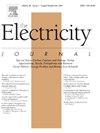提高电力网络的恢复能力:拍卖优先供电权,最大限度降低停电成本
IF 2.2
Q1 Social Sciences
引用次数: 0
摘要
本文提出了一种在电力供应中断期间最小化停电成本的方法,从而激励网络用户进行有效的弹性投资。它是为提高能源系统的弹性而建立激励机制的初步贡献。要解决的核心问题是网络运营商和网络用户之间在中断和备份成本方面的信息不对称。我们通过应用Vickrey-Clarke-Groves机制提出了网络用户之间优先位置的拍卖,并使用一个数值例子来解决这个问题。优先级位置意味着外部性:一个用户的优先级意味着其他用户稍后会重新连接并产生更高的成本。在这种机制下,每个中标者通过持有一定的仓位来支付施加在其他竞标者身上的外部性,排除了自己的出价,这导致了真实的竞标。通过最大限度地减少供电中断造成的损失,该机制不仅在短期内而且在长期内提高了电力系统的恢复能力。本文章由计算机程序翻译,如有差异,请以英文原文为准。
Increasing the resilience of electricity networks: Auctioning of priority supply to minimize outage costs
This article presents an approach to minimize outage costs during power supply disruptions and, thus, to incentivize efficient resilience investment by network users. It serves as an initial contribution to creating incentives for greater resilience in the energy system. The central problem to be solved is the information asymmetry between network operators and network users in terms of outage and backup costs. We present an auction of priority positions among network users by applying the Vickrey-Clarke-Groves mechanism, using a numerical example, to solve this problem. Priority positions imply an externality: the priority of one user means that others are reconnected later and incur higher costs. Under this mechanism, each winning bidder pays for the externality exerted on the other bidders by holding a certain position, excluding one’s own bid, which induces truthful bidding. By minimizing the damage from power supply interruptions, the mechanism improves the resilience of the power system not only in the short term but also in the long term.
求助全文
通过发布文献求助,成功后即可免费获取论文全文。
去求助
来源期刊

Electricity Journal
Business, Management and Accounting-Business and International Management
CiteScore
5.80
自引率
0.00%
发文量
95
审稿时长
31 days
期刊介绍:
The Electricity Journal is the leading journal in electric power policy. The journal deals primarily with fuel diversity and the energy mix needed for optimal energy market performance, and therefore covers the full spectrum of energy, from coal, nuclear, natural gas and oil, to renewable energy sources including hydro, solar, geothermal and wind power. Recently, the journal has been publishing in emerging areas including energy storage, microgrid strategies, dynamic pricing, cyber security, climate change, cap and trade, distributed generation, net metering, transmission and generation market dynamics. The Electricity Journal aims to bring together the most thoughtful and influential thinkers globally from across industry, practitioners, government, policymakers and academia. The Editorial Advisory Board is comprised of electric industry thought leaders who have served as regulators, consultants, litigators, and market advocates. Their collective experience helps ensure that the most relevant and thought-provoking issues are presented to our readers, and helps navigate the emerging shape and design of the electricity/energy industry.
 求助内容:
求助内容: 应助结果提醒方式:
应助结果提醒方式:


